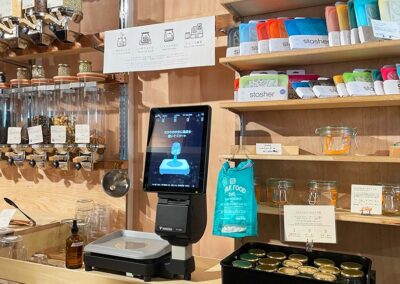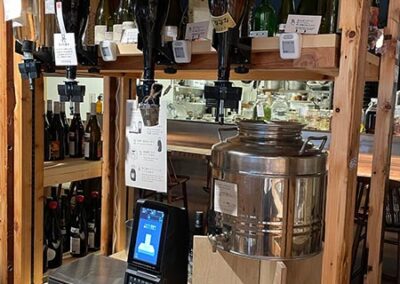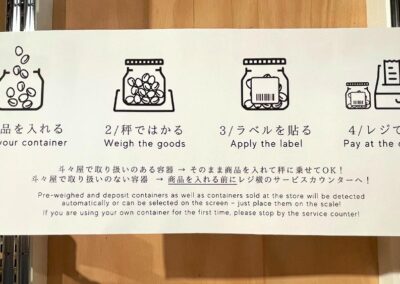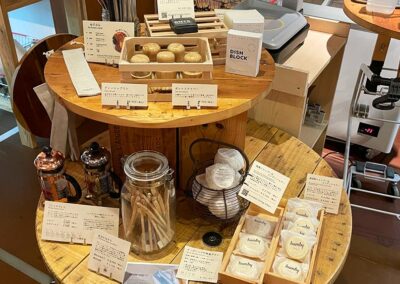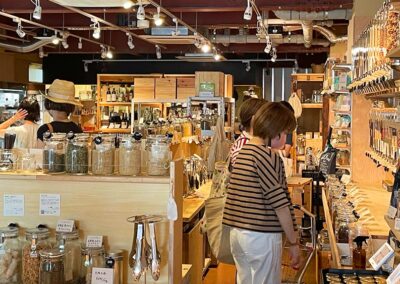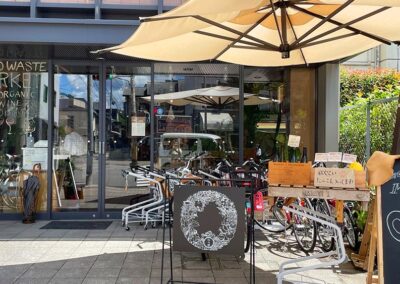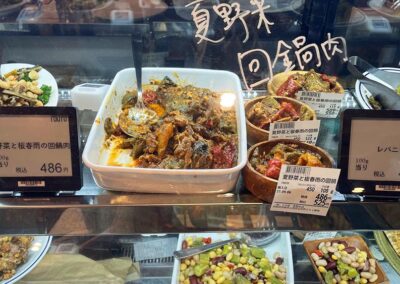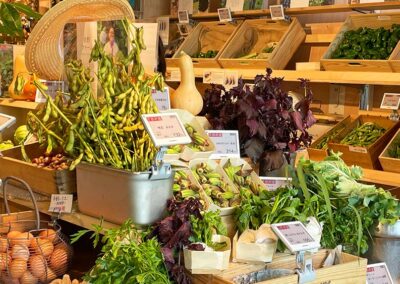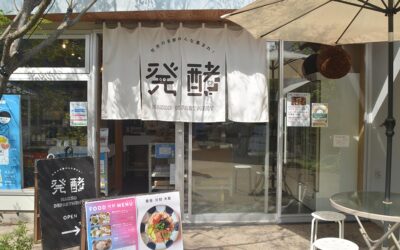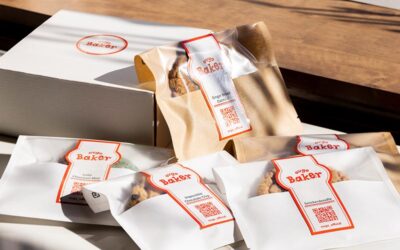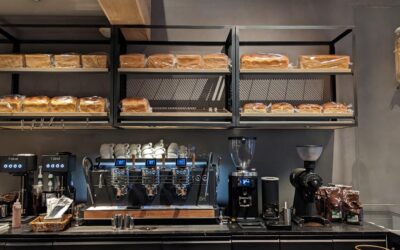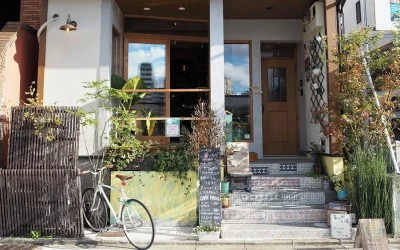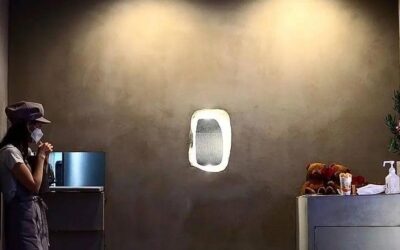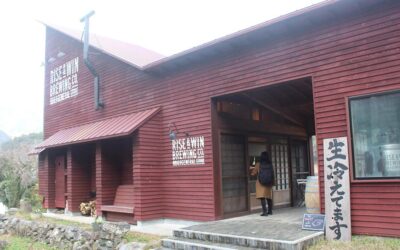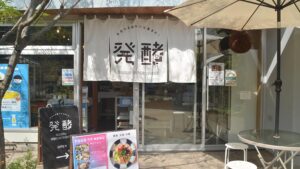A Kyoto supermarket built on the foundation of zero-waste
Zero Waste Market Totoya opened near downtown Kyoto in 2021. As well as a wide range of fresh vegetables, it sells dry goods such as beans, nuts, flour, pasta and noodles, seasonings such as oil, vinegar and soy sauce, cleaning products like laundry detergent and powdered bleach and soap, personal care products like lip cream and shampoo, and natural wine. The range of products is part of the reason it calls itself Japan’s first zero-waste supermarket.
One of the key ways the supermarket prevents the creation of waste is by not using packaging. Fresh vegetables are delivered in reusable cardboard boxes, and displayed and sold packaging free. For other goods, the store consulted with the producers to create reusable delivery containers tailored to their wares. For a maker of flavored kelp, for example, the store arranged a silicon container for transporting the product.
Zero Waste Market holds not only its methods to the highest standards, but also its products. Its fruit and vegetables are all organic and sourced directly from producers, many of whom are in the local region. Its imported goods are all fair trade, as well as organic.
The shop cuts out most packaging by selling products by weight. To make that approach work for the modern, time-pressed shopper, the company has come up with a system that makes the weighing process quick, simple and convenient. It calls it the most advanced approach in the world, ahead of even those used in more waste-conscious countries in Europe. It developed the system together with the Japanese company Teraoka Seiko.
How Zero Waste Market’s weighing system works
First of all, customers need to either bring their own containers to take their purchases home in, or buy one from the supermarket. As well as a range of reusable bags and silicon containers, the store also lends out jars and a stainless steel lunch box under a deposit system. The weights of the various containers available at the supermarket have all been registered in the digital scale system, so customers can select the appropriate container from the computer screen to deduct its weight from the total.
Customers can do the same for containers they have brought from home. Just inside the entrance is a scale that prints out an electromagnetic RFID tag of the weight of the empty container. That gets stuck to the container and topped with a waterproof sticker, meaning that each container need only be weighed once. The store also has many pre-weighed and stickered measuring cups on hand that allow users to transfer their goods to their own containers after measuring.
A motion sensor is also attached to each product stored in jars and dispensers. When the sensor is moved, it sends information about the contents of that jar to the closest scale. So, for product selection, too, the customer only has to press a button. The system prints out the price of the customer’s purchase on a barcode sticker that goes on the container and is scanned at the cash register.
Creating success from trial and error
Just a little more than a month since the store opened, staff were busy explaining the system to new customers. But employee Misaki Kitano says she has been surprised by how smoothly customers have taken to the system.
“Customers are having far less trouble shopping than I had expected. Even from the first day we opened, once we explained the system to them, they started using it as though they were seasoned regulars.”
Kitano estimates that more than 100 customers visit the store each day. All kinds of people come, she says, including many men and families. Among regular customers, most are women in their 30s and 40s, and while some live locally and others a ten-minute drive away, some travel by train for an hour to do their weekly shop at Zero Waste Market.
The smooth functioning of the store is not a surprise—it is something the company, Totoya Inc., has worked toward. In 2019, it opened its first store, nue by Totoya, in Tokyo, which traded only on Sundays and sold a smaller array of products that were mostly dry goods sold by weight. The accumulation of that hands-on knowhow and experimentation with new methods are key parts of the company’s greater business plan. They are central to the Kyoto store, too.
Cutting food waste by adding a restaurant
A new challenge at the Kyoto supermarket has been the addition of fresh vegetables. To prevent waste from them, Zero Waste Market includes a kitchen where unsold store produce is cooked into various dishes and sold in the delicatessen section. There is also a small restaurant at the back of the store where lunchtime patrons can dig into a plate of delicatessen dishes. In the evening, the restaurant serves up dishes that again use leftover produce from the supermarket. The minimal food waste that is created is made into compost and given to partner farms.
Totoya even cuts waste by not accepting a staple of Japanese social interaction, business cards. It uses a digital scanning service for that instead. Still, Kitano estimates the supermarket throws away a bag of non-recyclable trash once every three or four days, but is working to reduce that. This month the company is due to talk with producers in Europe that supply it with nuts and dried fruit about the vacuum packaging they come in to find a way to avoid plastic while still protecting the contents from humidity.
“We will talk with the companies in September about whether it’s possible to create a reusable vacuum pack out of silicon, instead. We are thinking of developing one,” Kitano says.
Zero Waste Market is also due to start developing a zero-waste way to sell meat. The company’s close contacts with suppliers and accumulated knowledge allow it to carry out calculated experiments in a way that larger companies can’t, Kitano says.
“For big supermarkets to try that trial and error without the zero-waste knowhow would cause them considerable financial loss. But with our smaller scale, we can explore and find better methods, and that will allow big, influential supermarkets to smoothly and quickly introduce zero-waste shopping thereafter.”
Leading the way to a zero-waste Japan
The motivation behind Totoya’s drive to improve comes in large part from its role as a pioneer. The company’s first store, nue by Totoya, now acts as a model for others who want to start their own packaging-free, sales-by-weight store. About 40 individuals have opened their own such stores after learning the knowhow via the “Totoya Friends” program that teaches participants what has worked for nue. Likewise, Zero Waste Market will become a model for zero-waste supermarkets. Getting things right, now, in Kyoto will have an exponential effect, not only for the company, but for Japanese society, too.
Totoya Inc.’s president, Atsuko Umeda, says that just one company operating plastic-free and free of waste doesn’t make much difference. “For that reason, at Totoya, through collaboration with other companies and as an intermediary between producers and consumers, we are aiming to get as many players involved as possible in order to make, not a sustainable company, but to contribute to a sustainable society.”
A different way of life
Umeda lives in France, where she runs a company that exports organic food and wine to Japan. Part of the impetus for Totoya came from the incongruity she felt in seeing that wine—made from sustainably grown grapes by producers concerned about the planet’s health—being wrapped in plastic as part of the sales process. On top of that, due to the availability of packaging-free stores in France, her own lifestyle there is almost waste-free. Knowing that such a lifestyle was possible, and aware of Japan’s over-packaging problem, Umeda took action.
“Looking at overseas examples, I saw that package-free stores like this and other businesses that are gentle to both the environment and society were successful. I also saw that consumers’ awareness was changing,” Umeda says.
It seems Japan’s big supermarkets have noticed that change, too. Representatives of Japanese supermarkets were among the visitors to the Zero Waste Market soon after it opened, Kitano says.
“Already in August, the heads of various supermarkets visited the store and talked with us, and we continue to talk with them. Originally, we didn’t intend to start consultancy so soon. Our plan was to open a Tokyo store next year, and we thought we would start on consultancy work after first carrying out franchising. But interest from other supermarkets has exceeded our expectations, so we’re conducting consultancy before we do franchising.”
Doing the right thing
Despite the speed of Totoya’s business expansion, Kitano expects Japan’s shift to a zero-waste society will take some time. “It won’t change overnight, but we need to provide consumers with a real choice about where to shop and how to shop in a way in which they can reduce the use of unnecessary plastic and have them gradually become accustomed to that. Having one store like this in each local area where they can shop zero waste will help that change happen.”
Indeed, the best intentions of consumers amount to nothing if there are no plastic-free stores for them to shop at. But there is more at stake here than just practical concerns. For Umeda, her actions are a question of principle.
“It is important for each individual to be able to live a plastic-free life, but as a business, if something can be improved, then…I think the decision should be made not just in favor of profit, but because it is the ‘right’ thing to do,” Umeda says.
This is why, unlike plastic-free stores in other countries, Totoya doesn’t give paper bags to its customers, and why the dispensers at Zero Waste Market are made of glass, rather than plastic like at those other stores. It is also, surely, why Totoya’s business is leaping ahead—we all know that plastic-free, zero-waste shopping is the right thing to do. Now Japan has one more leader to steer it toward that goal.
Originally published on Zenbird.Media.


